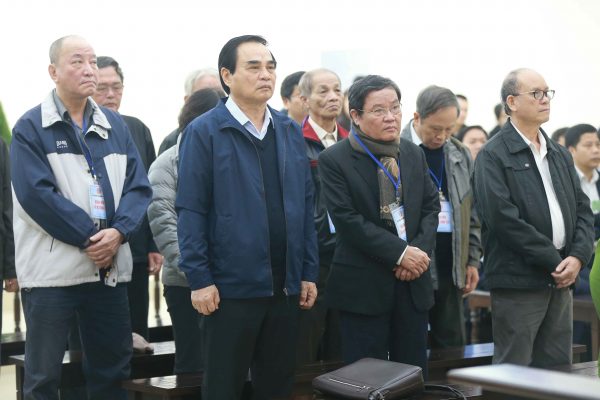But if Trong steps down at the 13th CPV National Congress early next year, it is uncertain whether the campaign can maintain momentum.
The campaign has strongly impacted Vietnamese politics over the past four years. Official statistics show that two Politburo members and 21 current and former CPV Central Committee members have been disciplined as a result of the campaign. Many of them were prosecuted and given long prison sentences, including former Politburo member Dinh La Thang and two former ministers of information and communications, Nguyen Bac Son and Truong Minh Tuan.
There’s no ‘no-go zone’ in this anti-corruption campaign. For the first time in its history, the Party has extended its anti-corruption drive into the police and armed forces, with 38 senior officers, including 23 generals, being disciplined or prosecuted over the past four years. These forces were largely exempt from anti-corruption efforts in the past due to their immense political power and their important role in regime security.
The unprecedented campaign has improved Vietnamese public confidence in CPV leadership and cemented Trong’s political position. Unlike the previous term of office when his authority was challenged by former prime minister Nguyen Tan Dung, Trong’s power and control over the political system have been strengthened. This enables him to single-handedly shape the Party’s agenda, including making personnel arrangements for the upcoming Party Congress.
Many of Trong’s political rivals have fallen victim to the campaign, including former cronies and associates of Dung. Meanwhile, several of his loyal and trusted followers have been promoted to key positions to facilitate his mandates. The most notable is Tran Cam Tu, who was appointed Head of the CPV’s Central Inspection Commission in May 2018 and has since acted as Trong’s right-hand man in his ‘crusade’ against corruption.
Although the campaign is welcomed by the public, its impact on the general state of corruption in Vietnam remains unclear. The campaign mainly targets high-level corruption, while corruption at lower levels of government, or in agencies that people and businesses frequently deal with, such as the tax and customs authorities, have not shown clear signs of improvement. Only 13 per cent of people surveyed in Ho Chi Minh City and 35 per cent of those surveyed in Hanoi believe that corruption has decreased over the past year.
The campaign has also made some officials unwilling to make major decisions or promote economic growth initiatives for fear of legal consequences. This has negatively impacted certain economic sectors, like the real estate industry of Ho Chi Minh City. Anti-corruption investigations and officials’ personal reservations have delayed the licensing process for property projects, leading to falling supply of new properties, surging property prices and declining government revenue from land fees. In light of this situation, Trong called for a stop to ‘self-preservation’ and the resulting inaction of officials in decision-making positions.
With the 13th CPV National Congress approaching, questions remain as to how the anti-corruption campaign will be maintained following any leadership changes made at the Congress. Trong will likely step down at the Congress due to his advanced age and fragile health. Given the level of control he has over the Party, his successor will likely be handpicked by him.
Trong will look for someone to carry on his legacy and continue the fight against corruption — a cause that he believes is crucial to the Party’s survival. Tran Quoc Vuong, the Standing Secretary of the CPV Central Committee’s Secretariat, so far appears to be his favourite candidate.
Still, whoever succeeds Trong will face significant challenges in continuing his anti-corruption mission at the same level witnessed over the past four years.
First, the new party chief will not have the same level of power and authority enjoyed by Trong. They will have to establish their own authority and power base within the first few years of their leadership. This might involve making compromises with corrupt officials or infighting with political rivals, distracting them from anti-corruption efforts.
Second, as most grand corruption cases have been prosecuted over the past four years, there remain few cases for the new leader to showcase their anti-corruption agenda, while uncovering new ones will take time.
Third, with the anti-corruption drive slowing economic activity in certain sectors, the new leadership might need to strike a balance between fighting corruption and promoting economic growth.
So while the new leadership will undoubtedly maintain the fight against corruption, it may be less broad and intense than it was under the watch of Trong. But this does not mean that the anti-corruption drive will become less consequential for Vietnam’s political economy.
Vietnamese officials should begin to shift the focus of the campaign by making more effort to fight lower level corruption rather than primarily focussing on grand cases. Overhauling various political and legal institutions to prevent corruption, rather than dealing with its consequences, will also make Vietnam’s fight against corruption more sustainable, effective and less dependent on any single politician.
Le Hong Hiep is a Fellow of the Vietnam Studies Programme at the ISEAS–Yusof Ishak Institute, Singapore.

